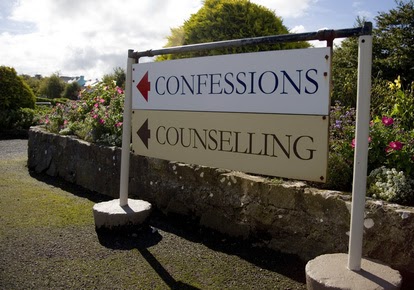Recently I have been reading a book called "Alone Together" by Sherry Turkle. She has brought many good points that I have either agreed greatly on or only slightly disagreed. This past week I read a chapter discussing a new topic regarding online confessions and the effects it has on its users. Online confession sites are places where people can go and
post confessions about things that have happened in their life. Most of the
time, the website lets the users post anonymously. This helps the poster feel
that they can really confess something without anybody in their life finding
out. Sometimes, users can post and comment on another person’s confession. They
can give feedback, or unfortunately express their anger at the confession.
These are almost like a catholic going to confession, without the priest.
Many people who use these sites are bored, lonely or just
looking for answers in other people. They rationalize that using these sites
help get things off of their chest. They don’t think these sites could do any
harm, especially because people don’t even have to use their name when posting.
Older people seem to use these sites in order to find something online that
they do not have in real life, such as a person they can trust with their
deepest secrets. Younger people tend to see these sites in many different ways
including just reading them for fun or actually using them to confess secret
things. Confession sites allow a poster to be anonymous just so they can get
things off their chest without anybody finding out it came from them
Venting is also another aspect of online confession sites.
Many people will go on these sites to talk about their personal life. They are
able to say whatever they want without feeling like it can come back to them in
real life. It is a way to get things off of their chest since there are many
things they want to say they might not even be able to tell their closest
friends. People are also able to read confessions and realize they may not be
alone and they are going through similar things. It is almost like a
justification for things they have done.
Even though the online confession sounds like a good deal,
there are repercussions a person may not foresee. A person is able to post
without using their name, but someone else is also able to comment on a
confession or post. Since they can comment without using a name, they do not
have to be nice or even helpful. They could be demeaning and leave the original
poster upset and feeling worse than before they posted the confession. These
are harsh comments that a person would probably not be able to say to the
person if they were meeting face to face. Sometimes it can be hard for the
poster to understand people are just being cruel.
Online confessionals can be seen as easy therapy sessions.
People are able to take a situation and post about it online, getting it off of
their chest, and feeling better about the situation. Even though some people
can post and be negative and not get the attention the poster was hoping for,
it can still ultimately help relief stress that can build up in a person that
keeps everything in.













